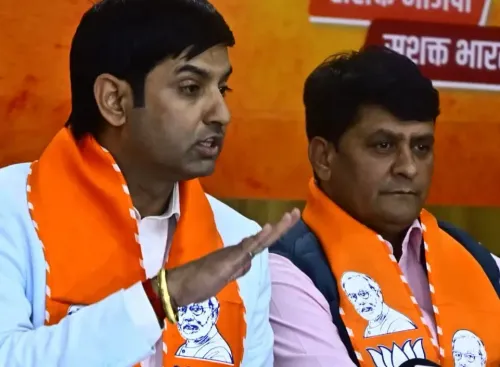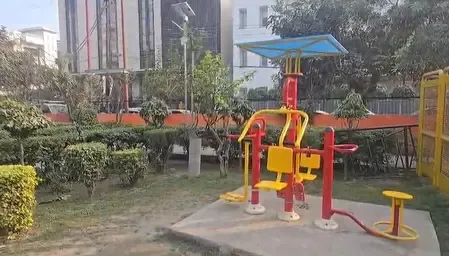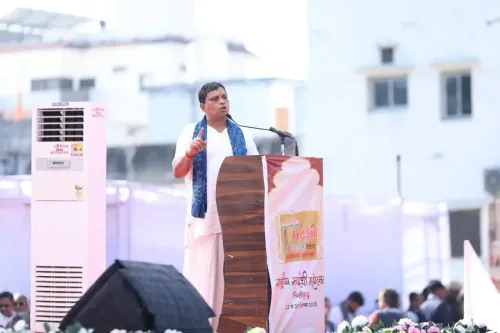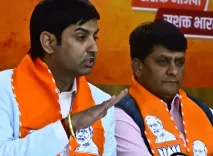Ongoing Diplomatic Efforts Indicate Positive Shift in India-China Relations: EAM Jaishankar
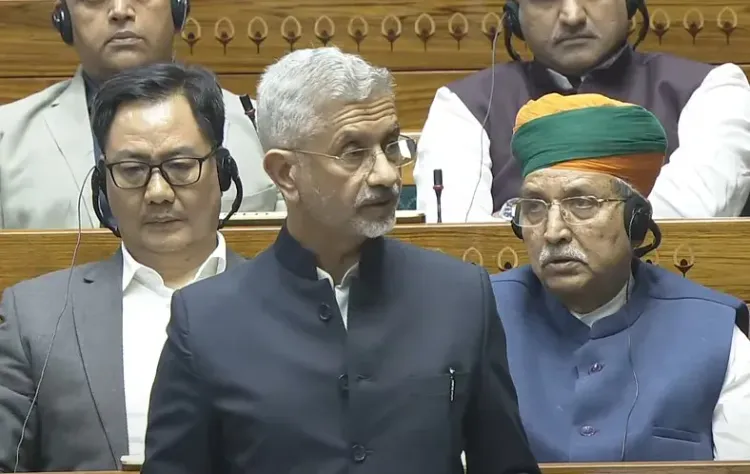
New Delhi, Dec 3 (NationPress) External Affairs Minister (EAM) S. Jaishankar remarked on Tuesday that the relationship between India and China, which has been abnormal since 2020, is progressing towards improvement after several significant diplomatic interactions. This includes the meeting between Prime Minister Narendra Modi and Chinese President Xi Jinping, which took place during the BRICS Summit on October 23.
In his address to the Lok Sabha concerning 'recent developments in India's relations with China', the EAM provided a comprehensive overview of the recent status of India-China relations, particularly in border regions, emphasizing the diplomatic and military actions taken to restore peace and tranquillity along the Line of Actual Control (LAC).
"Our relationship has been abnormal since 2020, when peace and tranquillity in the border areas were disturbed. Recent developments arising from our continuous diplomatic engagements have steered our ties towards some improvement," he stated.
He reiterated that the restoration of normalcy in India-China relations hinges on mutual sensitivity, respect, and interests.
"India-China relations cannot achieve normalcy without peace and tranquillity in border areas. The restoration of peace and tranquillity will serve as the foundation for advancing other aspects of our relationship," he emphasized, noting that ongoing diplomatic and military efforts are crucial in addressing challenges along the LAC and nurturing a stable bilateral relationship.
The EAM highlighted that while the bilateral relationship has evolved across various domains, it has been adversely affected by recent occurrences.
"We recognize that maintaining peace and tranquillity in border areas is essential for the development of our ties. In the near future, we will engage in discussions regarding both de-escalation and effective management of activities in the border regions. The completion of the disengagement phase now permits us to contemplate additional facets of our bilateral interactions in a measured way, prioritizing our national security interests. In my recent discussions with Foreign Minister Wang Yi, we reached an agreement that the special representatives and Foreign Secretary level mechanisms will convene shortly," he mentioned.
The meeting between PM Modi and Xi Jinping during the 16th BRICS Summit marked the first delegation-level interaction between the two nations in nearly five years, occurring shortly after the disengagement and patrolling agreements and the resolution of issues that had emerged in the India-China border areas in 2020.
Reflecting on the violent confrontations in the Galwan Valley in June 2020, Jaishankar recalled the seriousness of the situation, which resulted in fatalities for the first time in 45 years.
"The situation necessitated the deployment of heavy weaponry in close proximity to the LAC, leading to a decisive counter-deployment of adequate capabilities," he stated.
He noted that the October 21 agreement is the most recent in a series of understandings aimed at resolving issues at various friction points in eastern Ladakh following the events of May-June 2020 and the initial disengagement in Galwan Valley in July 2020.
The EAM elaborated on China's unlawful occupation of 38,000 square kilometers of Indian territory in Siachen since the conflict of 1962 and remarked on Pakistan's illegal cession of 5,180 square kilometers of Indian territory to China in 1963, which has remained under its control since 1948.
"India and China have engaged in discussions for several decades to resolve the boundary dispute," he affirmed.
He described the extensive troop deployment by China along the LAC in Eastern Ladakh during April-May 2020, which resulted in numerous face-offs and disrupted patrolling activities.
"It is commendable that our armed forces, despite logistical challenges and the prevailing COVID situation at the time, were able to rapidly and effectively counter-deploy," he noted.
In his statement, he also recounted the history of diplomatic interactions between India and China, beginning in 1988, when an understanding was reached to settle the boundary issue through peaceful dialogue. Agreements made in 1993 and 1996 established frameworks for maintaining peace along the LAC. He further referenced advancements, including the 2005 protocol on confidence-building measures and the establishment of the Working Mechanism for Consultation and Coordination (WMCC) in 2012.
"The purpose of recalling these agreements is to highlight the comprehensive nature of our collaborative efforts to ensure peace and tranquillity and to emphasize the seriousness of the disruptions in 2020 for our overall relationship," he asserted.
Jaishankar reaffirmed India's three fundamental principles: strict adherence to and respect for the LAC, no unilateral changes to the status quo, and compliance with previous agreements. He stressed that the restoration of peace and tranquillity is essential for normalizing India-China relations.
"The combination of a firm and principled stance on the situation in the border areas, along with a clearly articulated approach to the entirety of our ties, has formed the basis of our engagement with China over the past four years," he added.
In updating the House on the latest developments, Jaishankar referred to the October 21 agreement on disengagement in the Depsang and Demchok areas, which was achieved following extensive negotiations. He emphasized that patrolling in traditional areas has resumed after verifying disengagement on the ground.
"The issues in these two areas primarily revolved around obstructions to our long-standing patrolling activities and access for nomadic populations to traditional grazing grounds," he explained.
Jaishankar detailed several high-level engagements, including his meetings with Chinese Foreign Minister Wang Yi in Astana and Vientiane earlier this year, and again at the G20 Summit in Rio de Janeiro on November 18. National Security Advisors and Defense Ministers from both countries have also been engaged in active dialogue.
"In pursuit of these discussions, the Defense Minister met his Chinese counterpart at the ASEAN Defence Ministers' meeting on November 20 to review progress on the disengagement agreement, the necessity for de-escalation, and the enhancement of confidence-building measures," Jaishankar concluded.


